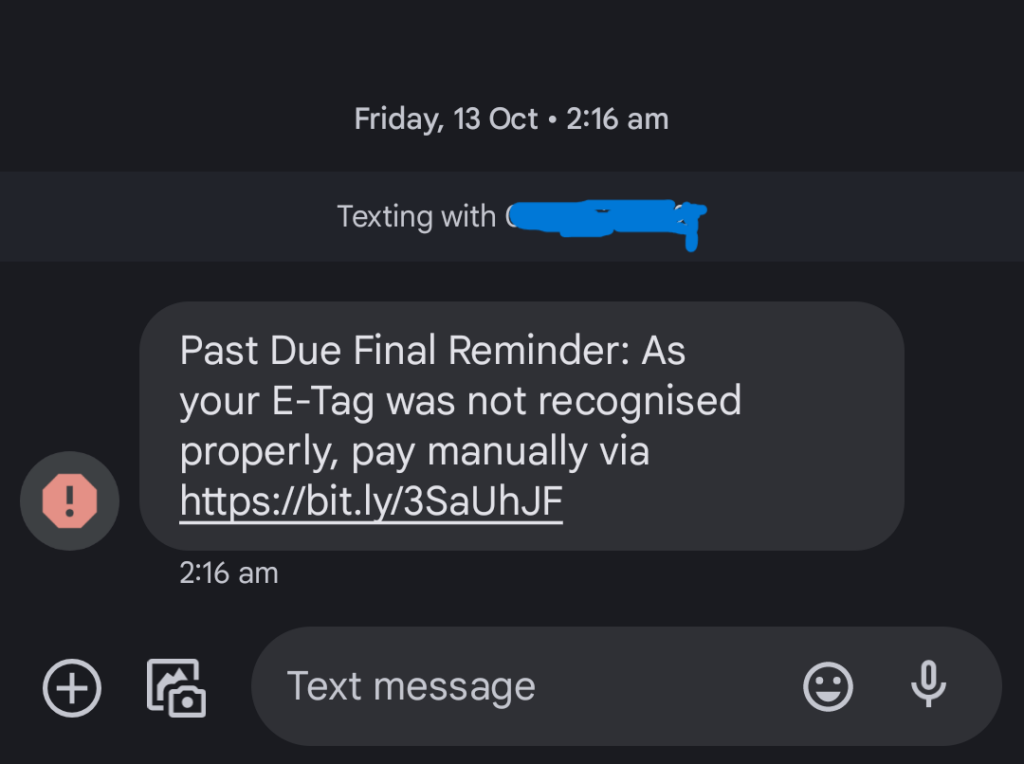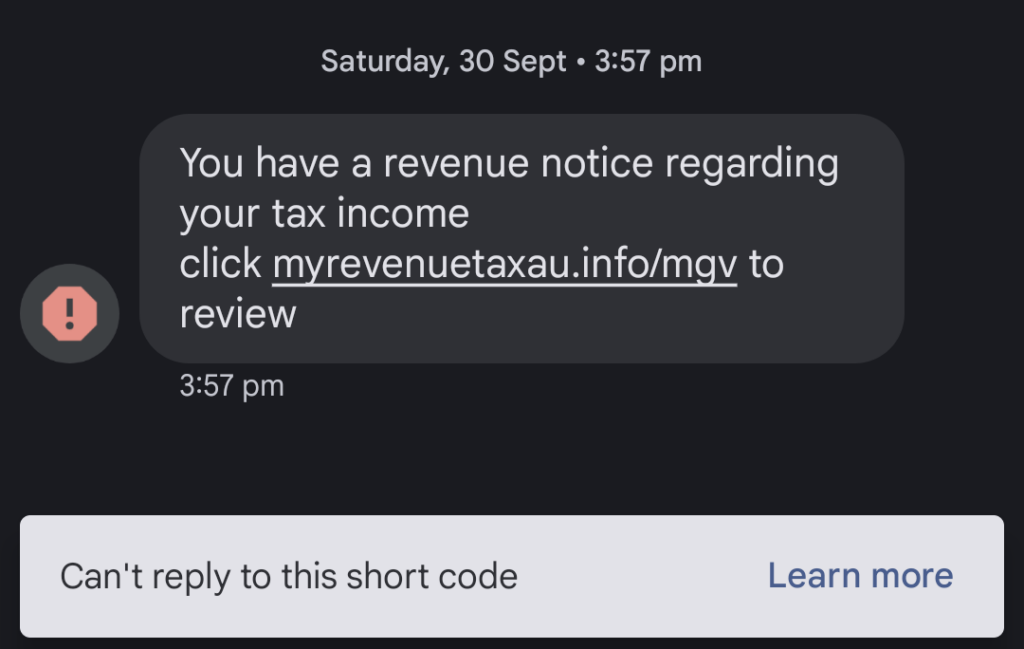Our team receives many types of scams every day. While some are very obviously phishing attempts, others are harder to spot. We want to share with you a list of the types of scams we have come across to help you protect your employees and your company. Please remember: Scammers don’t care about being cruel. They might present people with a hard scenario, such as a loved one being kidnapped or winning life-changing money.
Types of scams
‘Hi mum’ scam
One of the most dangerous types of scams is the ‘Hi mum’ scam which may also take place with other types of relatives. If someone comes across a ‘Hi mum’ scam and they don’t have a child, it’s relatively easy to realise that this is a scammer who is trying to contact them. However, if they do have a child, they might not understand that right away. The SMS usually contains an urgent call to action, such as someone losing their phone, being trapped in another city and so on.
The urgent calls to action aim to give the receiver little time to act. When a person doesn’t have time to think, they are more likely to make a mistake. If you receive this type of scam, it is advisable to call your loved one and check what their situation is.
This year, this scam has evolved, with scammers using AI to mimic the voices of loved ones. Their techniques are always evolving as technology evolves so it may be difficult at times to understand what is real and what is not.

Recruitment scam
In a world where the cost of living is rising, people are looking for high-paying jobs. Criminals are thinking ahead, and creating types of scams that will fit any situation, including an unsuspected victim who is looking for a job. While our team received those in an SMS, they may also try to contact victims via email. There are two types of scams we are aware of in this scenario:
- The scammer may use a company they have created with a fake website and phone number to seem legit. A thorough google search may show that the phone number is associated with current scams.
- They are claiming to be from big companies such as Seek and Indeed to earn the trust of the victim. In these situations, use the mindset of ‘It sounds too good to be true’. No one from job listing companies will contact you for jobs you haven’t applied for.
Luckily, Polonious is a great place to work – so none of our staff have been tempted to answer!
Amazon purchase scam
Out of all types of scams, this one may be the most common. Scammers may contact you either using a real person or a robotic voice and let you know that you made an Amazon purchase. If it’s a robotic voice, it will give people a number to contact or guide them to press a number so they can speak to a real person. If the scammer calls directly, they will try to convince the victim that someone has taken over their account. In some instances, they might go as far as photoshopping Amazon carts and sending them to people’s emails.
A victim may receive an ‘Amazon order confirmation’ before receiving an email following up warning them of suspicious account activity that urges them to call a number.
Please note that sometimes, the numbers they are using to carry out these scams are spoofed. So if you try to call these people back, sometimes you hear the voices of another person who has no idea what is going on.
Package delivery scam
Another popular one among other types of scams is the email or SMS that a package is awaiting for collection or needs payment to be delivered. This scam happens to many people worldwide and is betting on victims to be waiting for a package they have ordered. By pretending to be their local post office, they ask them to make a payment. The websites for the payment are usually very well created so they can convince the message receiver that they are real. The victim will then enter their card details which will then be stolen by the scammer.
Unfortunately, we know a few individuals that have fallen for this scam and they all fell for it for the same reason: fatigue. Scammers hope that the receivers are unprepared, caught off guard and tired so they have little to no time to think about their actions. No one wants their package to be held back or thrown away after a while, so after a long day at work, it’s easy to be on auto pilot.

Paypal scam
The PayPal scam is similar to the Amazon scam. The difference is that the invoice may be from any company including Apple, Samsung, eBay and more. The way it works is that scammers will send an invoice where they claim that you paid money with your PayPal to a big company. They claim that your order is “coming shortly” and this is how they create urgency. They give you a few minutes to think and give you a fake number to call.
The name and address on the delivery doesn’t match the victim’s details and the phone number is also different. In situations like these it is better to log into PayPal directly and restrict your spending limit temporarily for peace of mind. Don’t call the number on the invoice, instead, look for PayPal’s number for scam or fraud reporting and see if it matches. Call the number you find instead. It is always advisable to report all types of scams you receive so your email can recognise what a scam can look like and filter it out of your inbox.

Lottery scam
The lottery scam is as old as time. An email, SMS or phone call claim that you won a big amount of money. This should raise serious alarm bells if one doesn’t play any types of games but if they do, it is better to check the numbers themselves rather than believe a random text or person. Asking for proof in those situations may lead to a phishing email or website, specifically constructed to make victims believe that they actually won money.
Facebook scam and virus
On Messenger, scammers send around links pretending to be someone’s friend and urge them to click it by saying something along the lines of:
- Hey did you see the new iPhone?
- Is this video yours?]
- Look at what this celebrity did!
Because Messenger users know and trust the person sending them the link, they are less likely to check whether it’s genuine and they end up clicking on it.This may lead to someone’s account getting hacked and having their password and email stolen which will then compromise other account safety. Always be suspicious of links, no matter who they come from.

Toll scam
Many types of scams revolve around driving. It could be car insurance, a registration payment or a toll payment. One of our team members received a text message saying that their E-tag wasn’t recognised and encouraging them to pay using the link. These types of messages should be ignored. It is better to go through the website or check through other means if what the text is claiming is true. Clicking on a link to pay for something shouldn’t be the first course of action.
Employees who are using company vehicles and credit cards should receive additional training on what types of scams they may face when handling company assets.

Tax review scam
We have established that there are many types of scams. The reason there are so many is so that they can try every single way to make a person fall for at least one of them. The lottery scams may sound too good, the package delivery one might not work if they haven’t purchased something. That causes them to find more creative ways to steal which leads them to tax reviews. Scammers slightly modify links to make them seem as if they are specifically targeted to the country of the victim. For Australia, this would mean using AU in the link.
It is always wise to avoid clicking on links and instead visit mygov or the ATO directly. As people may struggle to tell if an SMS or email is real, it is better to be safe than sorry. Googling and logging in may take longer, but it will ensure that no one will have access to personal information.
Tax review scams can be dangerous as they may not only ask for financial information but data such as name, email address, residential address and more, which could potentially lead to identity theft.

Why should my company worry about these types of scams?
These types of scams show how easy it is to let your guard down and have financial or personal information stolen. What this means for a company is that employees may handle the organisation’s money and lose it to a phishing attempt. In the case that their identity is stolen, the scammer may try to contact other employees as now they are contacting them through a trusted source. And the cycle continues. This can be detrimental to the success of a company and impact employee wellbeing significantly.
How useful was this post?
Click on a star to rate it!
Average rating 0 / 5. Vote count: 0
No votes so far! Be the first to rate this post.
Let's Get Started
Interested in learning more about how Polonious can help?
Get a free consultation or demo with one of our experts
Eleftheria Papadopoulou
Eleftheria has completed a Bachelor's of Business with a major in Marketing at the University of Technology Sydney. As part of her undergraduate studies she also obtained a Diploma in Languages with a major in Japanese. Following her graduation she has been working as a Marketing Coordinator and Content and Social Media Specialist.
Eleftheria is currently finishing her Master in Digital Marketing.




